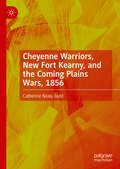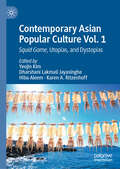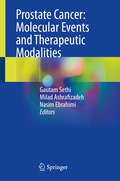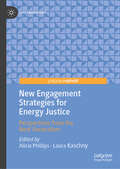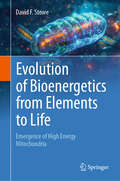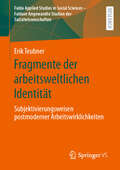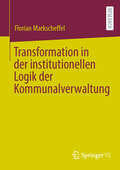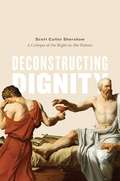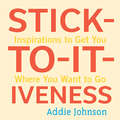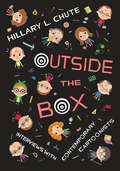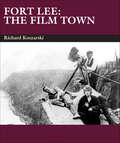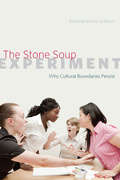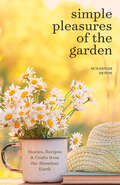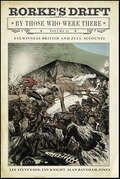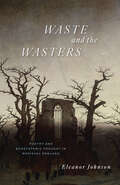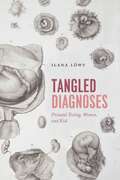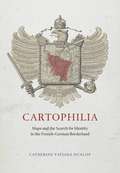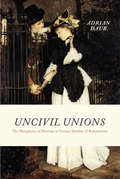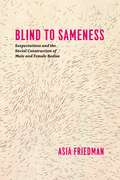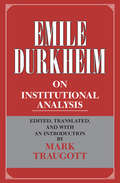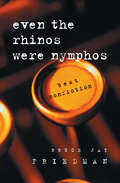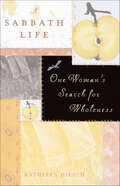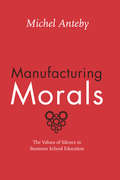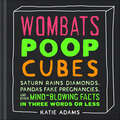- Table View
- List View
Cheyenne Warriors, New Fort Kearny, and the Coming Plains Wars, 1856
by Catherine Nealy JuddIn this book, Catherine Nealy Judd demonstrates the profound significance of a U.S military siege rashly launched from Fort Kearny against a small war party of Northern Cheyenne. This event occurred on the Platte River Road in August 1856 and triggered four Cheyenne reprisal counterattacks. Drawing on history, anthropology, geography, cultural studies, military records, governmental archives, diaries, letters, and other primary sources, Judd scrutinizes a tumultuous moment in the pre-railroad expansionist era, presenting her readers with a tale of struggle between Indigenous Americans and an increasingly aggressive federal military stationed at the forts of the Plains. As Judd scrutinizes the causes, conduct, and consequences of this long-neglected series of events, her insights encourage us to reassess the trajectories of federal aggression and of an Indigenous response to that bellicosity. By placing the Cheyenne Nation at the center of the history of the Overland Trail, this study offers a long overdue reinterpretation of the Platte River Road in the 1850s and beyond.
Contemporary Asian Popular Culture Vol. 1: Squid Game, Utopias, and Dystopias
by Karen A. Ritzenhoff Yeojin Kim Dharshani Lakmali Jayasinghe Hiba AleemThis first of two volumes explores how contemporary Asian popular culture reflects and critiques social issues. The authors, from different scholarly backgrounds, examine how shows like Squid Game present a scathing critique of oppressive socio-economic structures, conceptualize national heterotopias, utopias, and dystopias, and facilitate understanding of identity formation and discourses of resistance. The volume encompasses chapters discussing themes that intersect gender, race, politics, and social dynamics. It showcases ongoing developments in Asian popular culture in the wake of the global popularity of Squid Game and in anticipation of its second season release in December 2024.
Prostate Cancer: Molecular Events and Therapeutic Modalities
by Gautam Sethi Milad Ashrafizadeh Nasim EbrahimiThe book covers the various cell signaling pathways responsible for prostate cancer progression, conventional therapies used for prostate cancer treatment, new emerging therapeutics, and challenges in the treatment of cancer patients. It describes the different molecular pathways responsible for prostate cancer progression to improve readers' knowledge about the role of signaling networks, and cellular and molecular aspects of prostate cancer progression. These topics include mechanisms responsible for prostate cancer malignancy with a focus on molecular pathways. It also discusses the current challenges in prostate cancer treatment such as drug resistance and immune evasion and introduces novel therapeutics such as gene therapy and nanotherapeutics for prostate cancer. This book is completely novel and unique and covers all aspects of prostate cancer progression and challenges in therapy while presenting solutions. Written by prestigious researchers around the world, this book will be interesting to researchers and practitioners, especially those working in urological cancers.
New Engagement Strategies for Energy Justice: Perspectives from the Next Generation (Just Transitions)
by Alicia Phillips Laura KaschnyThis book offers an innovative exploration of energy justice, from concept to action, highlighting its role as a crucial tool for navigating the complexities of a just and sustainable energy transition. The book is timely and as the global energy transition rapidly progresses, it will serve as an essential resource, offering practical guidance to advancing a just and sustainable energy future. The perspectives presented in this book are presented by early career energy justice scholars from around the world, each highlighting and proposing ways to navigate the transition. The discussion focuses on three key themes: the integration and repurposing of energy infrastructures with the use of technology, the need for affordable and accessible energy services, and the promotion of responsible governance through effective policymaking and corporate social responsibility. At the heart of this book is the presentation of the ‘Toolkit to Achieve the Just Transition using the Energy Justice Framework’.
Evolution of Bioenergetics from Elements to Life: Emergence of High Energy Mitochondria
by David F. StoweThis book begins with the creation of the elements used in life and how these elements, as atoms, bound together into organic compounds and polymerized into lipids, peptides, and nucleotides. The text stresses the role and importance of the elements C, H, O, N, P, S, the univalent and multivalent ions, and the requirement of liquid water to foster prebiotic life. Expert author Dr. David Stowe explains the role of early molecular interactions in developing the first living prokaryote bacteria and their eventual engulfment as organelles to make eukaryotes that allowed their sophistication into specialized cells and large multicellular organisms. The book uniquely traces the genesis of bioenergetics and uses cardiac cell mitochondia as an evolutionary example for modern bioenergetic function. This book is geared toward graduate students, post-doctoral fellows, and other academics interested in evolutionary biochemistry with an emphasis on the early development of bioenergetics leading to modern, high energy mitochondria.
Fragmente der arbeitsweltlichen Identität: Subjektivierungsweisen postmoderner Arbeitswirklichkeiten (Fulda Applied Studies in Social Sciences – Fuldaer Angewandte Studien der Sozialwissenschaften #1)
by Erik TeubnerSeit dem Zeitalter des Postindustrialismus wird im Rahmen der Erwerbsarbeit verstärkt auf Subjektivität eingegangen. Doch wie beeinflusst Arbeit unser Selbstverständnis genau? Im Zeichen der Arbeitsforschung widmet sich dieses Werk der Aufgabe, verschiedene Facetten der Subjektivierung in der postmodernen Arbeitswelt aufzudecken. In fragmentarischem Stil behandelt jedes Kapitel einen anderen Phänomenbereich: von Zugehörigkeit, Anerkennung und Macht über Intrapreneurship und Sinn bis hin zu Zeit und Humor am Arbeitsplatz. Die jeweiligen Untersuchungen zu diesen Dimensionen von Arbeit eröffnen ein neues Reflexionsniveau für die Arbeitsforschung zur Frage, wie Imperative, Praktiken und Erfahrungen der postmodernen Arbeitswelt die persönliche Identität prägen und verändern. Das vorgestellte Konzept der lebensweltlichen Subjektivierung bietet dabei einen umfassenden Rahmen für eine interdisziplinäre Perspektivierung der Subjektivierungsanalyse, die sich auf Diskursforschung, Praxistheorie und Leibphänomenologie stützt. Dieses Buch lädt gleichsam dazu ein, dialektisch in die vielfältigen Selbstpositionierungen des Arbeitsalltags einzutauchen.
Transformation in der institutionellen Logik der Kommunalverwaltung
by Florian MarkscheffelDie Kommunalverwaltungen in Deutschland befinden sich in einem akuten Spannungsfeld: Der Reformdruck steigt, aufgrund diverser Herausforderungen wird eine neue Rolle gefordert, um gestaltend und moderierend auf die lokale sozial-ökologische Transformation zu wirken. Dem gegenüber steht jedoch eine fachlich wie gesellschaftlich debattierte Veränderungsresistenz der Verwaltung: Die Strukturen der Verwaltung scheinen ein Beharren auf etablierte Institutionen und Routinen zu befördern. Das vorliegende soziologische Buch adressiert diese Beharrungskräfte. Den theoretischen Rahmen stellen der Sozialkonstruktivismus sowie die institutionellen Logiken dar, empirisch wird eine Fallstudie im Modus des Transformativen Forschens mit explorierenden und narrativen Methoden ergründet. Die Stadtverwaltung der Fallstudie durchläuft einen Veränderungsprozess, der auf den Reformdruck eingeht. Im Fokus stehen die Erzählungen und Erlebnisse der Verwaltungsmitarbeitenden. Analysiert wurden die beschriebenen Institutionen und Routinen des Arbeitsalltages in der Verwaltungskultur, sowie die wahrgenommenen Herausforderungen im Change Prozess. Es zeigt sich, dass der Widerstand gegen Transformationen in der Struktur der Verwaltung verankert ist. Dementsprechendes Handeln der Mitarbeitenden wird in der institutionalen Ordnung befördert, unangemessenes Verhalten vermieden.
Deconstructing Dignity: A Critique of the Right-to-Die Debate
by Scott Cutler ShershowThe right-to-die debate has gone on for centuries, playing out most recently as a spectacle of protest surrounding figures such as Terry Schiavo. In Deconstructing Dignity, Scott Cutler Shershow offers a powerful new way of thinking about it philosophically. Focusing on the concepts of human dignity and the sanctity of life, he employs Derridean deconstruction to uncover self-contradictory and damaging assumptions that underlie both sides of the debate. Shershow examines texts from Cicero’s De Officiis to Kant’s Groundwork of the Metaphysics of Morals to court decisions and religious declarations. Through them he reveals how arguments both supporting and denying the right to die undermine their own unconditional concepts of human dignity and the sanctity of life with a hidden conditional logic, one often tied to practical economic concerns and the scarcity or unequal distribution of medical resources. He goes on to examine the exceptional case of self-sacrifice, closing with a vision of a society—one whose conditions we are far from meeting—in which the debate can finally be resolved. A sophisticated analysis of a heated topic, Deconstructing Dignity is also a masterful example of deconstructionist methods at work.
Stick-to-it-iveness: Inspirations to Get You Where You Want to Go
by Addie Johnson“Stick-to-it-iveness is a funny word,” Addie Johnson writes in the introduction of this small profound volume. “Some might say it’s not even a real word, but it speaks for itself.” In her winsome, quirky, inspirational style, Johnson shares ideas that inspire us to make light of the hard work of achieving our dreams. This is a book that attests to the power of a little bit at a time. There’s a simple key to accomplishing our wildest dreams—a secret, hidden in plain view--sticking to it.
Outside the Box: Interviews with Contemporary Cartoonists
by Hillary L. ChuteWe are living in a golden age of cartoon art. Never before has graphic storytelling been so prominent or garnered such respect: critics and readers alike agree that contemporary cartoonists are creating some of the most innovative and exciting work in all the arts. For nearly a decade Hillary L. Chute has been sitting down for extensive interviews with the leading figures in comics, and with Outside the Box she offers fans a chance to share her ringside seat. Chute’s in-depth discussions with twelve of the most prominent and accomplished artists and writers in comics today reveal a creative community that is richly interconnected yet fiercely independent, its members sharing many interests and approaches while working with wildly different styles and themes. Chute’s subjects run the gamut of contemporary comics practice, from underground pioneers like Art Spiegelman and Lynda Barry, to the analytic work of Scott McCloud, the journalism of Joe Sacco, and the extended narratives of Alison Bechdel, Charles Burns, and more. They reflect on their experience and innovations, the influence of peers and mentors, the reception of their art and the growth of critical attention, and the crucial place of print amid the encroachment of the digital age. Beautifully illustrated in full-color, and featuring three never-before-published interviews—including the first published conversation between Art Spiegelman and Chris Ware—Outside the Box will be a landmark volume, a close-up account of the rise of graphic storytelling and a testament to its vibrant creativity.
Fort Lee: The Film Town (1904-2004)
by Richard KoszarskiDuring the 1910s, motion pictures came to dominate every aspect of life in the suburban New Jersey community of Fort Lee. During the nickelodeon era, D.W. Griffith, Mary Pickford, and Mack Sennett would ferry entire acting companies across the Hudson to pose against the Palisades. Theda Bara, "Fatty" Arbuckle, and Douglas Fairbanks worked in the rows of great greenhouse studios that sprang up in Fort Lee and the neighboring communities. Tax revenues from studios and laboratories swelled municipal coffers.Then, suddenly, everything changed. Fort Lee, the film town once hailed as the birthplace of the American motion picture industry, was now the industry's official ghost town. Stages once filled to capacity by Paramount and Universal were leased by independent producers or used as paint shops by scenic artists from Broadway. Most of Fort Lee's film history eventually burned away, one studio at a time.Richard Koszarski re-creates the rise and fall of Fort Lee filmmaking in a remarkable collage of period news accounts, memoirs, municipal records, previously unpublished memos and correspondence, and dozens of rare posters and photographs—not just film history, but a unique account of what happened to one New Jersey town hopelessly enthralled by the movies.Distributed for John Libbey Publishing
The Stone Soup Experiment: Why Cultural Boundaries Persist
by Deborah DowningThe Stone Soup Experiment is a remarkable story of cultural difference, of in-groups, out-groups, and how quickly and strongly the lines between them are drawn. It is also a story about simulation and reality, and how quickly the lines between them can be dismantled. In a compulsively readable account, Deborah Downing Wilson details a ten-week project in which forty university students were split into two different simulated cultures: the carefree Stoners, and the market-driven Traders. Through their eyes we are granted intimate access to the very foundations of human society: how group identities are formed and what happens when opposing ones come into contact. The experience of the Stoners and Traders is a profound testament to human sociality. Even in the form of simulation, even as a game, the participants found themselves quickly—and with real conviction—bound to the ideologies and practices of their in-group. The Stoners enjoyed their days lounging, chatting, and making crafts, while the Traders—through a complex market of playing cards—competed for the highest bankrolls. When they came into contact, misunderstanding, competition, and even manipulation prevailed, to the point that each group became so convinced of its own superiority that even after the simulation’s end the students could not reconcile. Throughout her riveting narrative, Downing Wilson interweaves fascinating discussions on the importance of play, emotions, and intergroup interaction in the formation and maintenance of group identities, as well as on the dynamic social processes at work when different cultural groups interact. A fascinating account of social experimentation, the book paints a vivid portrait of our deepest social tendencies and the powers they have over how we make friends and enemies alike.
Simple Pleasures of the Garden: Stories, Recipes & Crafts from the Abundant Earth (Simple Pleasures Ser.)
by Susannah SetonSimple Pleasures Throughout the Year “Simple Pleasures has become my go-to book for remembering to slow down and enjoy the little things in life.” —Becca Anderson, bestselling author of Badass Affirmations, The Book of Awesome Women, and moreAn abundant sourcebook of ideas, encouraging quotes, recipes, and soothing activitiesSimple Pleasures of the Garden shows you how to appreciate the simple things within your daily activities. The secret to living well year round can be found in the abundance of your home garden, so get to planting those seeds of simple joys and herbal healing! Nurture your mind, body, and soul. Sometimes finding the positive can be hard, but it doesn’t have to be. From the recipe for a homemade herbal bath for a spa day to quick and easy recommendations for an instant room makeover, the suggestions and home recipes collected in this book offer a new appreciation for the everyday activities that nurture and comfort you.Simplify your emotional self care. Taking care of yourself doesn’t have to be expensive, unrealistic, or inaccessible. It can be as easy as tending to a green garden, making healing herbal tonics, sipping calming teas, or spending time with other natural energy boosters. Pleasures are made, not bought, so unlock new secrets to happiness with these touching stories, practical tips, and satisfying crafts. Inside this positive attitude book you’ll find: Ways to decorate your home with nature crafts, growing herbs, and an air of magic Advice on how to foster a routine for a rejuvenating self care yearTips on how to become the gardener of your moods and emotionsIf you liked seasonal self care books like A Year of Self-Care, Grow Your Own Medicine, or A Woman’s Garden, you’ll love Simple Pleasures of the Garden.
Rorke's Drift By Those Who Were There, Volume II: Eyewitness British and Zulu Accounts
by Ian Knight Lee Stevenson Alan Baynham-Jones"Yes you have beaten us; you had the best guns, but we have the best men...But we’ll fight again in two or three years’ time." – Prince Dabulamanzi kaMpande (who led the Zulu at Rorke’s Drift) On 22 January 1879, during the final hour of the Battle of Isandlwana – one of the greatest disasters ever to befall British troops during the Victorian era – a very different story was about to unfold a few miles away at the mission station of Rorke’s Drift. A Zulu force of more than 3,000 warriors had turned their attention to the small outpost, defended by around 150 British and Imperial troops. The odds of the British surviving were staggeringly low. The British victory that ensued, therefore, would go down as one of the most heroic actions of all time, and has fascinated military history enthusiasts for decades. In this classic work, Anglo-Zulu War experts Lee Stevenson, Alan Baynham-Jones and Ian Knight examine a wide range of personal testimonies from those present at Rorke’s Drift, while also presenting a clear overview of the battle in its entirety. By reading this account, readers will gain an impressive, unique breadth of knowledge about one of the most epic battles in British history. This updated edition includes even more first-person accounts from the combatants on both the British and Zulu sides. Providing personal, microscopic accounts of events, while at the same time presenting a clear overview of the battle in its entirety, this second volume completes the collection of accounts of the defenders of Rorke’s Drift and also includes contemporary accounts of those who saw the immediate aftermath of the battle.
Waste and the Wasters: Poetry and Ecosystemic Thought in Medieval England
by Eleanor JohnsonA groundbreaking examination of ecological thought in medieval England. While the scale of today’s crisis is unprecedented, environmental catastrophe is nothing new. Waste and the Wasters studies the late Middle Ages, when a convergence of land contraction, soil depletion, climate change, pollution, and plague subsumed Western Europe. In a culture lacking formal scientific methods, the task of explaining and coming to grips with what was happening fell to medieval poets. The poems they wrote used the terms “waste” or “wasters” to anchor trenchant critiques of people’s unsustainable relationships with the world around them and with each other. In this book, Eleanor Johnson shows how poetry helped medieval people understand and navigate the ecosystemic crises—both material and spiritual—of their time.
Tangled Diagnoses: Prenatal Testing, Women, and Risk
by Ilana LöwySince the late nineteenth century, medicine has sought to foster the birth of healthy children by attending to the bodies of pregnant women, through what we have come to call prenatal care. Women, and not their unborn children, were the initial focus of that medical attention, but prenatal diagnosis in its present form, which couples scrutiny of the fetus with the option to terminate pregnancy, came into being in the early 1970s.Tangled Diagnoses examines the multiple consequences of the widespread diffusion of this medical innovation. Prenatal testing, Ilana Löwy argues, has become mainly a risk-management technology—the goal of which is to prevent inborn impairments, ideally through the development of efficient therapies but in practice mainly through the prevention of the birth of children with such impairments. Using scholarship, interviews, and direct observation in France and Brazil of two groups of professionals who play an especially important role in the production of knowledge about fetal development—fetopathologists and clinical geneticists—to expose the real-life dilemmas prenatal testing creates, this book will be of interest to anyone concerned with the sociopolitical conditions of biomedical innovation, the politics of women’s bodies, disability, and the ethics of modern medicine.
Cartophilia: Maps and the Search for Identity in the French-German Borderland
by Catherine Tatiana DunlopThe period between the French Revolution and World War II was a time of tremendous growth in both mapmaking and map reading throughout Europe. There is no better place to witness this rise of popular cartography than in Alsace-Lorraine, a disputed borderland that the French and Germans both claimed as their national territory. Desired for its prime geographical position and abundant natural resources, Alsace-Lorraine endured devastating wars from 1870 to 1945 that altered its borders four times, transforming its physical landscape and the political allegiances of its citizens. For the border population whose lives were turned upside down by the French-German conflict, maps became essential tools for finding a new sense of place and a new sense of identity in their changing national and regional communities. Turning to a previously undiscovered archive of popular maps, Cartophilia reveals Alsace-Lorraine’s lively world of citizen mapmakers that included linguists, ethnographers, schoolteachers, hikers, and priests. Together, this fresh group of mapmakers invented new genres of maps that framed French and German territory in original ways through experimental surveying techniques, orientations, scales, colors, and iconography. In focusing on the power of “bottom-up” maps to transform modern European identities, Cartophilia argues that the history of cartography must expand beyond the study of elite maps and shift its emphasis to the democratization of cartography in the modern world.
Uncivil Unions: The Metaphysics of Marriage in German Idealism & Romanticism
by Adrian Daub“What a strange invention marriage is!” wrote Kierkegaard. “Is it the expression of that inexplicable erotic sentiment, that concordant elective affinity of souls, or is it a duty or a partnership . . . or is it a little of all that?”Like Kierkegaard a few decades later, many of Germany’s most influential thinkers at the turn of the eighteenth century wondered about the nature of marriage but rejected the easy answers provided by biology and theology. In Uncivil Unions, Adrian Daub presents a truly interdisciplinary look at the story of a generation of philosophers, poets, and intellectuals who turned away from theology, reason, common sense, and empirical observation to provide a purely metaphysical justification of marriage.Through close readings of philosophers like Fichte and Schlegel, and novelists like Sophie Mereau and Jean Paul, Daub charts the development of this new concept of marriage with an insightful blend of philosophy, cultural studies, and theory. The author delves deeply into the lives and work of the romantic and idealist poets and thinkers whose beliefs about marriage continue to shape ideas about gender, marriage, and sex to the present day.
Blind to Sameness: Sexpectations and the Social Construction of Male and Female Bodies
by Asia FriedmanWhat is the role of the senses in how we understand the world? Cognitive sociology has long addressed the way we perceive or imagine boundaries in our ordinary lives, but Asia Friedman pushes this question further still. How, she asks, did we come to blind ourselves to sex sameness? Drawing on more than sixty interviews with two decidedly different populations—the blind and the transgendered—Blind to Sameness answers provocative questions about the relationships between sex differences, biology, and visual perception. Both groups speak from unique perspectives that magnify the social construction of dominant visual conceptions of sex, allowing Friedman to examine the visual construction of the sexed body and highlighting the processes of social perception underlying our everyday experience of male and female bodies. The result is a notable contribution to the sociologies of gender, culture, and cognition that will revolutionize the way we think about sex.
An Atlas of Cat Anatomy
by Hazel E. Field Mary E. TaylorAn Atlas of Cat Anatomy can help a student learn twice as much as he could in the same amount of time using only a written description. The book is spiral bound and stands like an easel, taking a minimum amount of space in the work area. Altogether there are fifty-seven plates featuring the various parts and organ systems in their actual size, making identification remarkably easy. A brief verbal description accompanies each plate. In addition, the extensive glossary includes synonymous terms, derivations, definitions, and keys to pronunciation.
On Institutional Analysis (Heritage Of Sociology Ser.)
by Emile DurkheimRanging from Durkheim's original lecture in sociology to an excerpt from the work incomplete at his death, these selections illuminate his multiple approaches to the crucial concept of social solidarity and the study of institutions as diverse as the law, morality, and the family. Durkheim's focus on social solidarity convinced him that sociology must investigate the way that individual behavior itself is the product of social forces. As these writings make clear, Durkheim pursued his powerful model of sociology through many fields, eventually synthesizing both materialist and idealist viewpoints into his functionalist model of society.
Even the Rhinos Were Nymphos: Best Nonfiction
by Bruce Jay FriedmanA few years ago, Christopher Buckley wrote of Bruce Jay Friedman in the New York Times Book Review that he "has been likened to everyone from J. D. Salinger to Woody Allen," but that "he is: Bruce Jay Friedman, sui generis, and no mean thing. No further comparisons are necessary." We are happy to report that he remains the same Bruce Jay Friedman in his unique, unblinking, and slightly tilted essays—collected here for the first time—in Even the Rhinos Were Nymphos. A butler school in Houston, a livestock auction in Little Rock, a home for "frozen guys" in California, JFK's humidor in Manhattan—all are jumping off points for Friedman's baleful and sharply satirical scrutiny of American life and behavior in the second half of the twentieth century. Travel with Friedman from Harlem to Hollywood, from Port-au-Prince to Etta's Eat Shop in Chicago. In these pieces, which were published in literary and mass-circulation magazines from the 1960s to the 1990s, you'll meet such luminaries as Castro and Clinton, Natalie Wood and Clint Eastwood, and even Friedman's friends Irwin Shaw, Nelson Algren, and Mario Puzo. Friedman is a master of the essay, whether the subject is crime reporting ("Lessons of the Street"), Hollywood shenanigans ("My Life among the Stars"), or his outrageous adventures as the editor of pulp magazines (the classic "Even the Rhinos Were Nymphos"). We could sing his praises as a journalist, humorist, and social critic. But, as Buckley tells us, being Bruce Jay Friedman is enough. Bruce Jay Friedman is the author of seven novels (including The Dick, Stern, and A Mother's Kisses), four collections of short stories, four full-length plays (including Scuba Duba and Steambath), and the screenplays for the movies Splash and Stir Crazy.
A Sabbath Life: One Woman's Search for Wholeness
by Kathleen HirschPoetic and provocative, a challenge to women to create more spiritually rich and balanced lives. A successful writer and a committed feminist, Kathleen Hirsch, at age forty, finds herself searching for something more. How, she asks, can women's lives be more spiritually alive and whole? Can we reclaim in our most productive years what we sacrificed to earlier ideas of success? What is the place of silence and creativity in our busy lives?Unable to trek to Tibet or retreat to a cabin in the woods, she enters a season of reflection in the midst of her everyday life. A career crisis, the sudden death of a brother, and the birth of her son, all in a year's time, deepen her probing. Hirsch examines the role of women's friendships and the definition of worthwhile work. Her inner pilgrimage gradually moves her to seek out a range of remarkable women who are consciously trying to live in balance. They lead her to bold conclusions that will inspire many women who are seeking realistic ways to live more multidimensional lives.Beautifully written, A Sabbath Life will serve as A Gift from the Sea for the twenty-first century.
Manufacturing Morals: The Values of Silence in Business School Education
by Michel AntebyCorporate accountability is never far from the front page, and as one of the world’s most elite business schools, Harvard Business School trains many of the future leaders of Fortune 500 companies. But how does HBS formally and informally ensure faculty and students embrace proper business standards? Relying on his first-hand experience as a Harvard Business School faculty member, Michel Anteby takes readers inside HBS in order to draw vivid parallels between the socialization of faculty and of students. In an era when many organizations are focused on principles of responsibility, Harvard Business School has long tried to promote better business standards. Anteby’s rich account reveals the surprising role of silence and ambiguity in HBS’s process of codifying morals and business values. As Anteby describes, at HBS specifics are often left unspoken; for example, teaching notes given to faculty provide much guidance on how to teach but are largely silent on what to teach. Manufacturing Morals demonstrates how faculty and students are exposed to a system that operates on open-ended directives that require significant decision-making on the part of those involved, with little overt guidance from the hierarchy. Anteby suggests that this model—which tolerates moral complexity—is perhaps one of the few that can adapt and endure over time.Manufacturing Morals is a perceptive must-read for anyone looking for insight into the moral decision-making of today’s business leaders and those influenced by and working for them.
Wombats Poop Cubes: Saturn Rains Diamonds, Pandas Fake Pregnancies, and Other Mind-Blowing Facts in Three Words or Less
by Katie AdamsLearn the facts! In Katie Adams' Wombats Poop Cubes, you will encounter some of the most unbelievable, entertaining, and no-frills factoids ever.Each page features a fact broken down into just three words. Why? Because gimmicks are great, and so is getting to the point. If you crave more information beyond those three special words, check out the full backstory alongside the fact. Fill that brain of yours with memorable gems of truth to learn hundreds of new things, to become an unstoppable trivia partner, or for no particular reason at all. Included are shocking and concise truths such as:· Vikings rap battled.· Bees get drunk.· Abraham Lincoln wrestled.· Kangaroos can’t reverse. · Apples are roses.· Rabbits attacked Napoleon.Have some fun. Keep it short. Get some facts!
